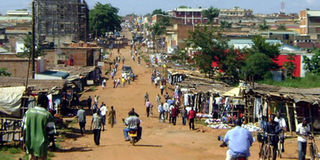City status: Omoro rejects proposal to merge with Gulu

However, when Gulu District political and technical leaders headed by the chairman, Mr Martin Ojara Mapenduzi, went to meet their counterparts of Omoro in a recent follow-up meeting, they were told their request would not be granted since the 2015 resolutions were null and void.
What you need to know:
- Demand. Gulu Municipality was requested by government to have, among others, a population of 300,000 people, a master plan, administrative units and modern roads before the city status can be granted.Gulu has not met the population requirement.
Omoro District leaders have turned down a proposal seeking to merge part of its territory to Gulu Municipality as the latter seeks to be granted city status.
Plans are underway by the Ministry of Lands, Housing and Urban Development to elevate Gulu, Arua, Mbale and Mbarara municipalities to city status. But one of the conditions for acquiring city status is to have a population of 300,000 people, which Gulu Municipality does not have.
And now the municipality has asked Omoro to allow it to include Ongako and Koro sub-counties in its municipal boundaries so as to reach the required population.
However, Omoro District chairperson Douglas Peter Okello said the merger is illegal.
“I have realised we are not reading from the same page, not because we do not want a city status but because we are confusing the legal meaning of the merger and I want to make it very clear that on April 6, the request by Gulu was pronounced null and void,” Mr Okello said.
The district leader’s rejection stems from 2015 when Gulu municipal council resolved to expand its municipal boundaries to cover 13.7km.
The expansion meant that Ongako and Koro sub-counties of present day Omoro District would be merged into the municipality.
In July 2015, all the four sub-counties resolved in their respective council meetings to accept the merger and Ms Dorothy Ajwang, the then CAO, submitted the resolution to the permanent secretary Ministry of Local Government.
However, Omoro District, formerly Omoro County, was carved out of Gulu and made a district on September 3, 2015, becoming operational on July 1, 2016.
As a result, the Ministry of Local Government recently granted the district six new sub-counties that will become operational in the next financial year.
Two of the new sub-counties (Labora and Abuga) were carved from the contested Koro and Ongako sub-counties.
But on April 6, Gulu CAO Milton Kato wrote to the Omoro District leadership, formally requesting them to effect the merger as endorsed before Omoro became a fully-fledged district.
However, when Gulu District political and technical leaders headed by the chairman, Mr Martin Ojara Mapenduzi, went to meet their counterparts of Omoro in a recent follow-up meeting, they were told their request would not be granted since the 2015 resolutions were null and void.
According to Mr Okello, Omoro has new administrative units which cannot be dismantled for the sake of the merger.
“Now that government has granted us these new administrative units (six new sub-counties and parishes), the request by Gulu to merge part of our territory becomes invalid since some of the parishes affected fall under the newly created sub-counties not the former sub-counties by the time of the passing of the resolution,” he said.
Mr Okello stated that that for the expansion request to be granted, Gulu District has to come up with a new resolution.
“That resolution has to be reviewed by Gulu in line with the new boundaries of the newly created sub-counties.”
Mr Mapenduzi, however, said it is not possible to come up with another resolution on the same matter.
“We are not taking any new resolution to Cabinet because the one we have now is the one that was approved by them, awaiting passing by Parliament. We are only calling upon authorities of Omoro to rethink and allow the alteration of the boundaries of the affected sub-counties,” he said.
Ongako Sub-county chairman William Ociti said: “None of us is against the idea but allow us to give our people the opportunity to voice their concerns on this. They have to be consulted, we proposed this move while still in Gulu and now that we are part of Omoro, they must have their say because a city comes with a lot of amendments and impact.”




